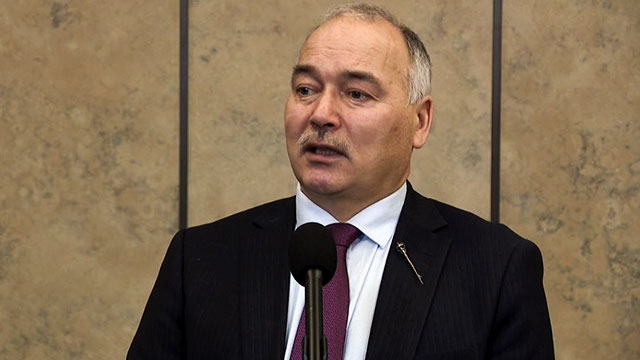
APTN News
Nunavut Premier Joe Savikataaq says he raised a number of issues facing his territory in a meeting with Prime Minister Justin Trudeau in Ottawa on Thursday but didn’t get any commitments to fix them.
“You know about Nunavut issues so I don’t have to education you, just re-educate you,” said Savikataaq during the photo op with the prime minister.
After the two leaders went behind closed doors.
Then Savikataaq met with media.
“Some of the issues we talked about were health care, devolution, climate change, addiction treatment centres,” said Savikataaq in a scrum with reporters after the meeting.
Savikataaq is the latest provincial and territorial leader to meet with Trudeau in Ottawa as Parliament is set to resume with a minority government.
One of the major issues raised by Savikataaq during the meeting was housing.
Nunavut is short by about 3,000 homes.
According to government statistics, 27.9 per cent of Nunavut homes have more than one person per room compared to the rest of Canada which sits at 3.4 per cent.
Also, 30.2 per cent of homes need major repairs compared to the rate in the south which his half that at 15.4 per cent.
“His (Trudeau) commitment was to work on it some more. He’s fully aware that we have a housing crisis and I mentioned that due to overcrowding there’s many negative issues that come out of it such as addictions, family violence, health issues, so it’s at the base of all the negative stuff that happens in the north so he’s quite aware we need more housing,” said Savikataaq.
At the moment, the money need to fix the housing shortfall in Nunavut is pegged at $2 billion according to the Nunavut Housing Corporation.
Nunavut will receive $274.6 million from the federal government for housing over the next nine years.
“I explained that the best way to make more houses, well the only way to make more houses is to inject more funds into it and he’s aware of the issues and I didn’t get a commitment other than he’s committed to working on the issue,” the premier said.
One issue that didn’t come up in the meeting but the premier was asked about after is the federal carbon tax.
Savikataaq has said in the past that he opposes the tax for northerners.
The carbon tax is the federal levy on oil, gasoline and electricity.
Four provinces currently have their own version of a carbon tax; British Columbia, Ontario, Quebec and Nova Scotia. Alberta has a carbon tax but Premier Jason Kenney introduced legislation to repeal it.
In Nunavut where the effects of climate change are being acutely felt and there are few options other than diesel powered generators for each community which now cost extra to run because of the carbon tax.
“In Nunavut it’s just a tax because we don’t have any alternative energy sources and I brought up that climate change is effecting Nunavut and Nunnavumiut more than any one else,” he said. “But we don’t have any alternative energy sources right now. Wind is not reliable, solar is not that reliable and when you get into the high arctic where it’s dark 24 hours a day for four months it’s absolutely not reliable. We want to do our share because we feel the effects, but the carbon tax is just a tax.
“It doesn’t do any good to fight something that is already in place so we just want to get more resources and do our share to mitigate the effects of climate change.”
Savikataaq said people in the north should receive more of a rebate than people living in the south.
“When the carbon tax was imposed in Nunavut it pushed the price of fuel up and the price of heating fuel and gasoline up,” he said. “But it also pushed the price up of all the freight that comes up, all the food that comes up so it just compounds everything on the costs and we have the highest cost of living right now.”
Savikataaq says that Nunavut feels neglected.
“We’re so far lacking on infrastructure and our basic needs are not to the same standards as someone living in southern Canada,” he said. “The federal government should do some nation building and they have to do some nation building within Nunavut – but we are proud to be part of Canada and there’s no qualms about that.”
@aptnnews
with files from Christopher Read









